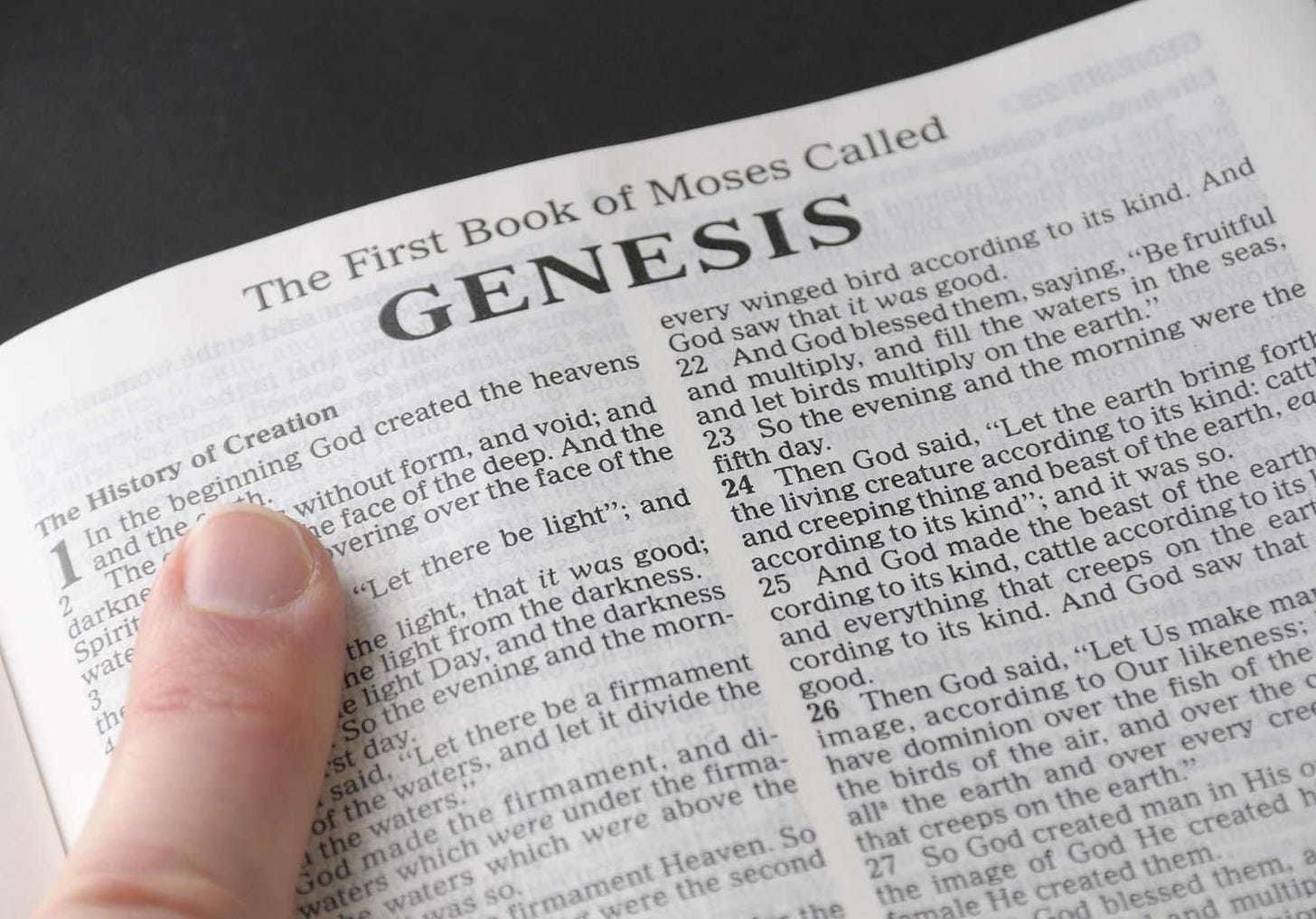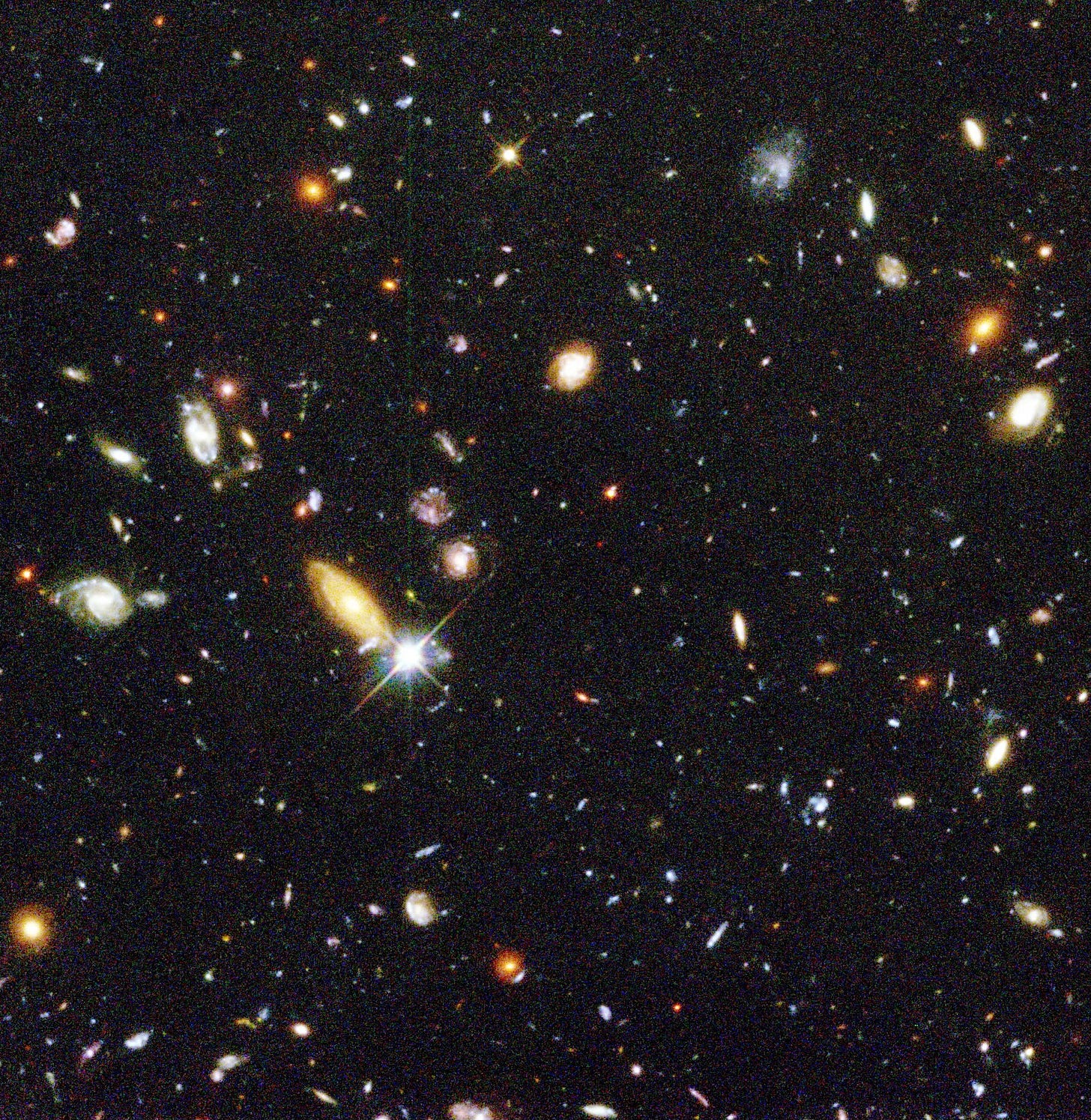God created the heavens and the earth
Genesis 1:1-2 The second part of a short series on the beginning of Genesis

בְּרֵאשִׁית בָּרָא אֱלֹהִים אֵת הַשָּׁמַיִם וְאֵת הָאָרֶץ׃
“In the beginning God created the heavens and the earth. The earth was formless and void, and darkness was over the surface of the deep, and the Spirit of God was moving over the surface of the waters.”
Genesis 1:1-2 NASB1995
Two days ago I published the first part of this short series about the first verses of Genesis. That article was primarily a personal testimony of how a practitioner of applied science (AKA an engineer) came to the logical conclusion that intelligent design was behind the creation of the universe, and that the designer was God.
Today I’m looking at the first ten words of the Bible: “In the beginning God created the heavens and the earth.” You might wonder who the author of the book of Genesis was; common belief has it that it was written by Moses, based on tablets of stone or clay that were passed down over the generations “from the beginning” until they came into his hands.
Many sections of Genesis begin with the phrases “this is the history” (Gen 2:4, Gen 37:2) or “this is the genealogy” (Gen 5:1, Gen 6:9, Gen 10:1, Gen 11:10, etc…), indicating that Moses was writing the book based on prior written records which God had preserved and Moses had collected.
I found this next bit of commentary from Enduring Word to be informative. It’s under a section titled “The philosophical importance of knowing God as creator”:
a. The philosopher Jean-Paul Sartre and many others have stated the essential problem of philosophy: that there is something, instead of nothing. Why? Everything else in our life flows from the answer to this question.
i. If everything around us, including ourselves, is the result of random, meaningless occurrences apart from the work of a creating God, then it says something about who I am, and where I, and the whole universe, are going. If that is the case then the only dignity or honor we bestow upon men is pure sentimentality, because we don’t have any more significance than an amoeba and there is no greater law in the universe than survival of the fittest.
Accepting God as the creator of all that has existed throughout time dignifies our existence!
A word study of Genesis 1:1 provides further enlightenment. We start with the Hebrew word רֵאשִׁית (rē'šîṯ), a noun meaning “beginning”, or “first step in the course of events”. That “course of events” is the history of our universe. What happened at that beginning?
God (אֱלֹהִים, 'ĕlōhîm) created the heavens and the earth. At His first mention in the Bible, we find that God is not a singular being. Elohim is a plural masculine noun that has the meaning of rulers, judges, or divine beings. It’s fascinating that at this earliest point in scripture there is a reference (although not explicitly) to the Trinity, which isn’t fully developed until the incarnation of Jesus and His mention of the Holy Spirit in the Gospels.
It was only after full awareness of the Father, Son, and Holy Spirit in the New Testament Gospels that the early church began to see that as far back as Genesis — the literal beginning — the Trinity appeared in scripture.
Next is the word בָּרָא (bārā'), defined as “to create, shape, form”. What did Elohim create? שָׁמַיִם (šāmayim) — the heavens — and אֶרֶץ ('ereṣ) — the earth. The definition of samayim also includes “the visible universe” and “abode of the stars”.
In ten English and a lesser number of Hebrew words, we have the first written description of how everything came to be. Once again citing Enduring Word, we can see just how important these first words in the Bible actually are:
If you believe Genesis 1:1, you really have no problem believing the rest of the Bible. The God big enough to have created the heavens and the earth is big enough to do all the rest the Bible says that He did and does.
Many of our friends who follow Heaven On Wheels know that both Barb and I have had a lifelong interest in astronomy, cosmology, and physics. That interest has repeatedly demonstrated to us just how great God is. From Enduring Word:
i. A typical galaxy contains billions of individual stars; our galaxy alone (the Milky Way) contains 200 billion stars. Our galaxy is shaped like a giant spiral, rotating in space, with arms reaching out like a pinwheel, and our sun is one star on one arm of the pinwheel. It would take 250 million years for the pinwheel to make one full rotation. But this is only our galaxy; there are many other galaxies with many other shapes, including spirals, spherical clusters, and flat pancakes. The average distance between one galaxy and another is about 20 million trillion miles. Our closest galaxy is the Andromeda Galaxy, about 12 million trillion miles away.
ii. For every patch of sky the size of the moon, if you could look very deep, you would see about a million galaxies.
In 1995, the Hubble Space Telescope did a set of observations known as the Hubble Deep Field. Staring at a very small piece of the universe with the telescope produced this stunning image:
The image shows a central portion of the Hubble Deep Field, created from exposures taken in 1995. The Hubble Deep Field covers a piece of sky about 1/13th the diameter of the full Moon. NASA, Robert Williams, and the Hubble Deep Field Team (STScI)
Each of the “blobs” in this image is a galaxy like our very own Milky Way, containing hundreds of billions of stars. And all of that is God’s creation. What makes the argument that the universe is a product of God’s intelligent design so compelling is that the design is so perfect. From Enduring Word:
God created: Inherent in the idea of God is that He is an intelligent designer. Only an intelligent designer could create a just-right universe, not chance. Our universe is a just-right universe. According to Hugh Ross in his book The Fingerprint of God:
i. The universe has a just-right gravitational force.
· If it were larger, the stars would be too hot and would burn up too quickly and too unevenly to support life.
· If it were smaller, the stars would remain so cool, nuclear fusion would never ignite, and there would be no heat and light.
ii. The universe has a just-right speed of light.
· If it were larger, stars would send out too much light.
· If it were smaller, stars would not send out enough light.
iii. The universe has a just-right average distance between the stars.
· If it were larger, the heavy element density would be too thin for rocky planets to form, and there would only be gaseous planets.
· If it were smaller, planetary orbits would become destabilized because of the gravitational pull from other stars.
iv. The universe has a just-right polarity of the water molecule.
· If it were greater, the heat of fusion and vaporization would be too great for life to exist.
· If it were smaller, the heat of fusion and vaporization would be too small for life’s existence, liquid water would become too inferior a solvent for life chemistry to proceed, ice would not float, leading to a runaway freeze-up.
v. We could conclude that there is no chance that such a universe could create itself, apart from an intelligent designer.
Two days from now I’ll take a look at some of the other wonders found in Genesis 1:1.
Heaven On Wheels Daily Prayer:
Father in Heaven, each day I find new reasons to praise You with all of my heart, mind, soul, and strength as I contemplate Your creation and the perfection found within it. I thank You for opening my eyes to see Your handiwork in everything. AMEN.





Beautiful Steve thank you